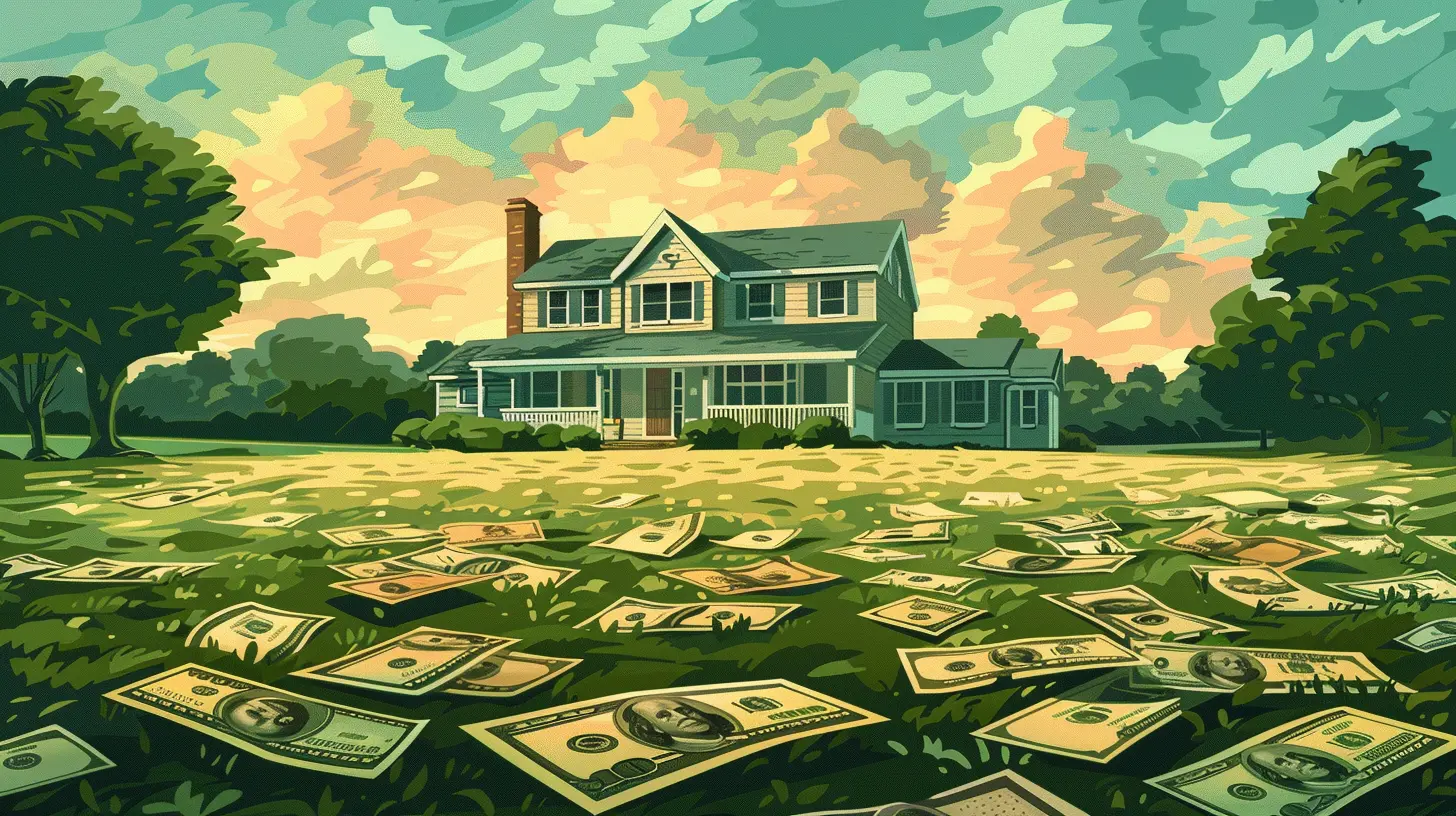How to Avoid Common Home-Buying Scams
28 November 2024
Buying a home is, without a doubt, one of the most exciting yet nerve-wracking experiences of adulting. It’s like hosting a dinner party—you're excited, but there’s always that one uncle who shows up uninvited (read: scammers). Sadly, while you’re busy dreaming about cozy evenings in your new home, someone else might be dreaming about cozying up to your hard-earned cash.
Don’t worry—I’ve got your back. By the end of this read, you’ll be armed with enough knowledge to spot home-buying scams from a mile away. Ready? Let’s dive in. 
What Are Home-Buying Scams, Anyway?
Okay, let’s get this out of the way—scammers are creative. They can make Monopoly money look like legal tender. Essentially, a home-buying scam is any shady trick designed to separate you from your money (and sometimes your sanity) during the home-buying process.From fake listings to phishing emails that make your grandma’s chain mail look amateur, these scams come in all shapes and sizes. Some are obvious, while others are sneakier than that one cat that always ends up inside your house (seriously, where does it come from?). 
Top Home-Buying Scams You Need to Know
Grab a snack because this part is about to get real. Here are the most common home-buying scams and how they can fool even the savviest buyer:1. Phantom Listings
Ah, phantom listings—much like the ghost in your grandma’s attic, they don’t exist. Scammers post fake properties online, often at jaw-droppingly low prices. Their goal? To lure you in like a moth to a flame.Once you’re hooked, they’ll ask for a deposit or personal information (sometimes both). The twist? There’s no property, and you’re left cursing the day you clicked that listing.
How to Spot This Scam:
- The price is way too good to be true.
- The "agent" refuses to meet in person or let you view the property.
- They ask for payment upfront via wire transfer or gift cards (red flag alert).
2. Wire Fraud
Wire fraud is the scam equivalent of a magician pulling a rabbit out of a hat—except the rabbit is your money, and it’s never coming back. Here's how it works: You’re about to close on your dream home, and you receive an email with “updated” wiring instructions for your closing funds. Spoiler alert: that email isn’t from your lender, but from a scammer.How to Protect Yourself:
- Always verify wiring instructions by calling your lender directly at a verified number.
- Be cautious of urgent or last-minute changes. Scammers thrive on panic!
- Look out for typos or overly generic language in emails (e.g., “Dear Customer”).
3. The Fake Realtor/Agent
Not everyone wearing a suit and carrying a clipboard is a legit realtor. Some scammers pose as real estate agents, racking up deposits and fees only to vanish faster than free pizza at the office.They might even show you a property they have no authority to sell. Imagine falling in love with a home only to find out it’s not for sale—or worse, someone else owns it!
How to Avoid This Scam:
- Ensure your agent is licensed. Most states have online databases where you can verify credentials.
- Trust your gut. If an agent refuses to provide ID or proof of licensing, that’s your cue to walk (or run) away.
- Never pay cash or wire money directly to the “agent.”
4. Rental Scams Crawling Into Home-Buying
Ever heard of rental scams spilling into the home-buying space? Picture this: You’re contacted by someone claiming to be the "homeowner" (usually from another state or country). They’ll ask for a deposit, claiming they’ll send you the keys or transfer ownership once they’ve received the payment.Spoiler: You’ll be waiting for those keys until the cows come home.
Protect Yourself:
- Meet the “owner” in person or consult the property records to confirm their identity.
- Payment before paperwork? Hard pass.
5. Bait-and-Switch Schemes
This is the real estate equivalent of ordering a luxury car and receiving a beat-up minivan. Scammers list properties with high-end features, “convenient locations,” and bargain prices, only to rope you into a far less desirable property (one that’s probably falling apart like an old paperback novel).How to Avoid Getting Duped:
- Tour the property in person (or virtually, if necessary).
- Don’t let anyone pressure you into making snap decisions.
- Cross-check listings on multiple platforms.
6. Title Fraud
You’re minding your business with your new home when WHAM! A stranger shows up claiming they own the property. Scammers use forged documents to “transfer” ownership of a property to themselves—or worse, sell it to someone else while you’re still unpacking boxes.How to Protect Yourself:
- Invest in title insurance (seriously, it’s worth it).
- Monitor your title regularly through your county’s property records. 
General Tips to Outsmart Scammers
Let’s be real: scammers thrive on confusion and desperation. Here’s how you can stay a step ahead:1. Educate Yourself
If you’re new to home-buying, research like your savings depend on it—because they do. Familiarize yourself with the process and common red flags.Think of it like going to a buffet: You wouldn’t load your plate without first scoping out what’s actually good, right?
2. Work with Trusted Professionals
Surround yourself with a dream team—licensed agents, reputable lenders, and real estate attorneys. They’ll act as your watchdogs, helping you navigate the murky waters of home-buying.3. Don’t Rush
Buying a home isn’t like speed dating. Take your time, read the fine print, and double-check everything. Scammers love when you’re in a hurry because it means you’re less likely to spot their tricks.4. Trust Your Gut
Ever get that weird feeling in the pit of your stomach? Trust it! Your instincts are your first line of defense against shady schemes.
What to Do If You Fall Victim
So what happens if the unthinkable happens? First off, don’t panic. Scammers might steal your money, but they haven’t stolen your power.Here’s what you should do:
1. Report it: Contact local law enforcement AND file a complaint with the Federal Trade Commission (FTC).
2. Inform your bank: Call your bank or credit card company immediately if you’ve made a payment.
3. Spread the word: Sharing your story could prevent others from falling victim.
Final Thoughts
Buying a home should feel like walking into a rom-com montage, not a true-crime documentary. While scammers are as sly as foxes, a little caution and a lot of common sense can keep them at bay.Remember: If something smells fishy, it probably is. (Unless you’re buying a house near the sea, in which case, carry on!) Stay sharp, stay skeptical, and soon enough, you’ll be turning the key to your dream home without any nightmares.
all images in this post were generated using AI tools
Category:
Residential Real EstateAuthor:

Lydia Hodge
Discussion
rate this article
21 comments
Matteo Moses
Great tips! Always good to stay informed and vigilant!
February 8, 2025 at 9:26 PM

Lydia Hodge
Thank you! Staying informed is key to a successful home buying experience.
Skylar McIlroy
Amidst the allure of dream homes lies a shadowy underbelly of deception. Discover the subtle clues that can unveil hidden traps, turning your home-buying journey into a safe and rewarding adventure.
February 4, 2025 at 5:15 AM

Lydia Hodge
Thank you for highlighting the importance of staying vigilant in the home-buying process! Recognizing red flags can truly make a difference.
Zephyrine Miller
Trust your instincts, verify.
February 1, 2025 at 12:06 PM

Lydia Hodge
Absolutely! Trusting your instincts while verifying information is crucial in protecting yourself from scams.
Zethryn Kline
Stay savvy and informed—your dream home is worth the effort! 🌟🏡
January 29, 2025 at 11:32 AM

Lydia Hodge
Thank you! Staying informed is key to finding your dream home safely. 🌟🏡
Hugo Sawyer
Great tips! Staying informed is key to buying safe.
January 28, 2025 at 4:50 AM

Lydia Hodge
Thank you! Staying informed is essential for making safe and smart home buying choices.
Naya McCullough
Great tips! Stay vigilant and trust your instincts—your dream home is waiting, scam-free and just for you!
January 23, 2025 at 12:13 PM

Lydia Hodge
Thank you! Staying vigilant is key to finding your dream home safely. Happy house hunting!
Aisha McAdoo
Great article! It's crucial to stay informed and vigilant while navigating the home-buying process. Your tips on identifying scams are invaluable for anyone looking to make a safe investment. Thanks for shedding light on this important topic—happy house hunting, everyone! 🏡✨
January 20, 2025 at 7:48 PM

Lydia Hodge
Thank you for your kind words! I'm glad you found the tips helpful. Happy house hunting! 🏡✨
Elwynn Simon
Thank you for this informative article! The tips provided on identifying and avoiding common home-buying scams are invaluable, especially for first-time buyers. It's crucial to stay vigilant and informed in today’s market. Looking forward to more insights on real estate safety!
January 18, 2025 at 7:54 PM

Lydia Hodge
Thank you for your kind words! I'm glad you found the tips helpful. Stay tuned for more insights on real estate safety!
Bianca Wilkins
Great insights! Protecting yourself during the home-buying process is crucial. Thanks for highlighting these scams—knowledge is the best defense for buyers!
January 17, 2025 at 8:24 PM

Lydia Hodge
Thank you! I'm glad you found the insights helpful. Staying informed is key to a safe home-buying experience!
Eliza Coleman
Buying a home can feel like a game of real estate Twister—just when you think you’re standing on solid ground, someone yells 'Scam!' Just remember: if it sounds too good to be true, it probably involves a big inflatable lawn flamingo!
January 15, 2025 at 8:40 PM

Lydia Hodge
Great analogy! Staying informed and trusting your instincts is key to navigating the home buying process safely.
Carly Adkins
Great insights, very helpful!
January 12, 2025 at 11:28 AM

Lydia Hodge
Thank you! I'm glad you found it helpful!
Julian McCarthy
Great tips! Staying informed is key to protecting yourself from scams in the home-buying process. Thank you!
January 10, 2025 at 11:48 AM

Lydia Hodge
Thank you for your feedback! Staying informed is indeed crucial in navigating the home-buying process safely. Happy to help!
Beatrix Beck
Great insights! Avoiding common home-buying scams is so crucial in today’s market. Your tips really highlight the importance of staying informed and trusting your instincts. Thanks for sharing this valuable information—it’ll definitely help first-time buyers navigate the process with confidence!
January 3, 2025 at 1:18 PM

Lydia Hodge
Thank you! I'm glad you found the tips helpful. Staying informed is key to a successful home-buying experience!
Christina McWilliams
Knowledge is your best defense; stay informed, trust your instincts, and never underestimate the power of due diligence in home-buying!
December 28, 2024 at 8:01 PM

Lydia Hodge
Thank you for your insightful comment! Staying informed and diligent is indeed crucial in avoiding scams. Knowledge truly empowers homebuyers!
Maren White
Great insights! Staying informed is key to navigating the real estate market and avoiding pitfalls. Knowledge empowers buyers to make safe decisions.
December 26, 2024 at 5:38 AM

Lydia Hodge
Thank you! I completely agree—staying informed is crucial for making safe and informed decisions in real estate.
Alice McDowney
Buying a home shouldn’t feel like a game of Monopoly! Keep your eyes peeled for scams, or you might end up paying for Boardwalk... in fake money!
December 23, 2024 at 12:18 PM

Lydia Hodge
Absolutely! Staying informed is key to avoiding scams and making a smart investment. Always do your research and trust your instincts!
Sylvan McGehee
This article provides essential insights for prospective homebuyers on navigating the complex real estate landscape. By highlighting red flags and emphasizing due diligence, it empowers readers to protect themselves from common scams. Staying informed and vigilant is key to making secure and confident home-buying decisions. Great resource!
December 18, 2024 at 12:37 PM

Lydia Hodge
Thank you for your kind words! I'm glad you found the article helpful in navigating the home-buying process and staying vigilant against scams.
Uriel Riley
Thank you for this insightful article! Your tips on recognizing and avoiding home-buying scams are invaluable for first-time buyers navigating this complex process. Great read!
December 12, 2024 at 12:19 PM

Lydia Hodge
Thank you for your kind words! I'm glad you found the tips helpful for first-time buyers. Happy house hunting!
Geneva Young
Remember, if the deal sounds too good to be true, it probably involves a magician and a rabbit!" 🐇🏡
December 3, 2024 at 1:44 PM

Lydia Hodge
Great point! Always trust your instincts and do thorough research to avoid scams. 🏡✨
Jax Wilcox
Buying a home shouldn’t feel like a game of ‘Guess Who?’ Just remember: if the deal seems too good, it probably needs a warning label!
December 1, 2024 at 7:29 PM

Lydia Hodge
Absolutely! Trust your instincts, do thorough research, and always be cautious of deals that appear too good to be true.
Elowyn Conrad
Great tips! Stay savvy and safe!
November 29, 2024 at 1:30 PM

Lydia Hodge
Thank you! Staying informed is key to a safe home-buying experience!
MORE POSTS

Real Estate Fraud in Timeshare Sales: What You Need to Know

How Well-Prepared Homes Pass Inspections with Ease

The Tenant Demographic Effect on Real Estate Syndication Success

Home Staging for Sellers on a Tight Budget

How to Find Upcoming Real Estate Auctions in Your Area

Courteous Strategies for Real Estate Bidding Wars

What Buyers Should Know About Respecting Time Slots for Viewings

How to Secure Your Real Estate Transactions from Cyber Fraud

The Rise of Tiny Homes with Big Green Features

Age-Friendly Features to Look for When Downsizing for Retirement

A Guide to Respectful Communication Between Buyers and Sellers

Best Practices for Keeping Your Cool in a Competitive Market

How Eco-Friendly Paints and Finishes Can Transform Your Home